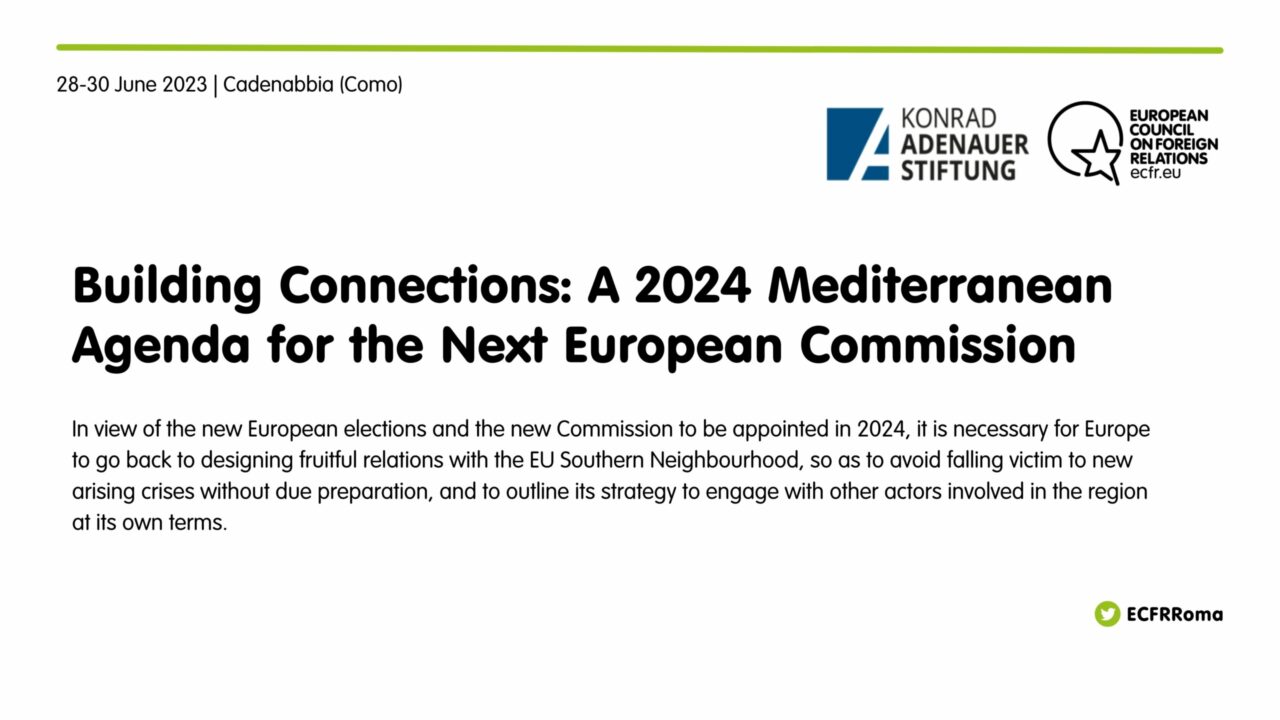Building Connections: A 2024 Mediterranean Agenda for the Next European Commission
Expert workshop on a new Mediterranean agenda for the EU, organized by the Rome office of ECFR and the Regional Program Political Dialogue South Mediterranean of the Konrad-Adenauer- Stiftung (KAS PolDiMed)
President Ursula Von der Leyen’s 2019 declarations regarding the desire to launch a more geopolitical EU Commission – one keen on more proactive and effective international projection in view of the goal of European strategic autonomy – have often remained on paper. As a matter of fact, the health crisis first, then the ensuing economic crisis, and finally the difficulties in the energy and defence domains due to the Russian invasion of Ukraine have forced purely reactive measures, taking away space for other initiatives. Europe cannot risk focusing its efforts on a single front, namely the defence of Ukraine, while forgetting its Mediterranean and African neighbours. Not least because the same actors that threaten security and economic relations on a global level, Russia and China, are increasingly present in the MENA region, while regional actors such as Gulf countries and Turkey are also advancing their strategies in the area. It is therefore necessary for Europe, in view of the new European elections and the new Commission to be appointed in 2024, to go back to designing fruitful relations with the EU Southern Neighbourhood, so as to avoid falling victim to new arising crises without due preparation, and to outline its strategy to engage with other actors involved in the region at its own terms.
Against this backdrop, the need to overcome previous patterns and past projects – from the Barcelona Process to the EU Neighbourhood Policy – is dictated by a broader competition over the region in comparison with the past, as well as by evidence that the EU southward approach – geopolitically speaking as well as the level of more sectorial policies – has much room for improvement.
In this sense, a new European narrative and policy based on a partnership between equals, on mutual economic benefit, inclusiveness, and sustainability is increasingly needed. To do so, the EU should adopt a more pragmatic approach, drawing on a tool such as the EU Global Gateway, and increasingly orient it towards its Southern Neighbourhood with the ultimate goal of economically developing and politically stabilizing an area of renewed centrality.
While reviewing its main pillars of engagement with the region, such as conditionality, in a more effective way and in tune with the current dynamics of power, Europe should not put aside its principles on the respect for human rights and the rule of law. Rather, it should work to promote them hand in hand with greater socioeconomic opportunities for the countries in the area, thus also creating solid alternatives to the phenomenon of emigration to Europe.
To discuss these timely issues, the Rome office of the European Council on Foreign Relations (ECFR) and the Regional Program Political Dialogue South Mediterranean of the Konrad-Adenauer- Stiftung (KAS PolDiMed) are pleased to organized the expert workshop Building Connections: A 2024 Mediterranean Agenda for the Next European Commission.
Agenda
Panel 1: A New Map of Power Relations of the MENA region: looking for Europe
In order to outline an effective Mediterranean Agenda for the 2024 EU Commission, and after a relevant turning point for international politics such as the war in Ukraine, it is necessary to reassess the map of power relations around the MENA region, and to understand the role and space for Europe beside other international and regional actors whose influence in the area has been increasingly growing in the past few years.
Panel 2: Four Years Later: an assessment of the Von der Leyen’s Commission Med Agenda
During the past four years the consequences of the pandemic and of the Russian war in Ukraine have diverted the attention of the EU on areas other than the MENA region. Thus, despite the willingness to usher in a more geopolitical era for Europe, so far the approach of the Von der Leyen’s Commission towards the Southern Neighbourhood has not lived up to expectations, reiterating the same old patterns in spite of the evidence of their ineffectiveness. In this framework, this panel aims at providing a critical and constructive assessment of both EU Mediterranean policies and geopolitical approach towards the MENA region.
Panel 3: Fixing a Hole: a truly Mediterranean strategy for the 2024 Commission
How should the Mediterranean Agenda of the new EU Commission look like? How should the EU make use of its standing and of the tools at its disposal to reform its approach towards the region? Drawing on the former discussion, this final, policy-oriented panel will explore a new, sustainable and long-term EU strategy for the Southern Neighbourhood, focusing on key areas such as economic development, energy and migration.

